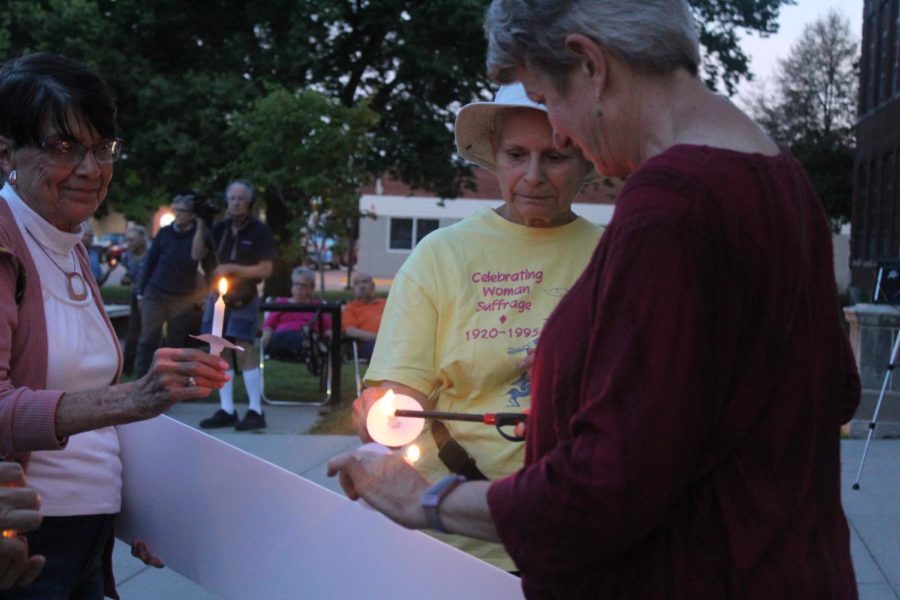- News
- News / Politics And Administration
- News / Politics And Administration / Campus
- News / Politics And Administration / City
- News / Politics And Administration / State
Activists hold candlelight vigil for voting rights
Ames community members begin lighting candles at the Shine a Light for Democracy Vigil on Aug. 6 at City Hall. The event took place on the 54th anniversary of the 1965 Voting Rights Act’s passage and was meant to highlight the Supreme Court decision in Shelby County v. Holder’s elimination of the act’s pre-clearance provision.
August 6, 2019
Voting rights advocates around the country held candle-light vigils Tuesday night, demanding Congress restore protections of the 1965 Voting Rights Act (VRA).
At the Ames vigil, the winner of Tuesday’s special election, Ross Wilburn, shed light on the delicacies of the democratic process and the importance of securing the right to vote.
“There are a lot of subtle ways that those who are looking to discriminate can go about doing that — things like setting an election in August when students and faculty are on vacation,” Wilburn said.
Wilburn won the northwest Ames seat in Iowa House District 46 Tuesday in a special election triggered by the resignation of former Rep. Lisa Heddens, who took a seat on the Story County Board of Supervisors.
“As a former local elected official, I believe in local control,” Willburn said. “However … it is important our state and federal laws set a floor that we do not go below. We do not want our states discriminating.”
Taylor Blair, senior in industrial design, spoke at Tuesday night’s vigil, citing common barriers particular to students in the voting process.
“Since my first week on campus, I was volunteering with campaigns,” Blair said. “Every year that I’ve been a part of the process, I’ve gotten to have less conversations about the issues … and more conversations about how to access the vote.”
In the face of Iowa’s new voter identification laws, requiring voters to present a valid state-issued ID at the polls, Blair asked how Iowa State can maintain student participation and accessibility to the polls.
“Iowa State has the ability to add expiration dates to our student ID cards,” Blair said. “By adding one simple line every single Iowa State student will be able to use their ISUCard to vote … [Iowa State] says it’s too expensive, but I think it’s worth every dollar.”
Iowa and other states have begun to require voters to provide such state-issued identification before their votes can be counted.
Sen. Herman Quirmbach, D-Ames, gave the final testimony at Tuesday night’s vigil. Quirmbach regarded the history of American voting rights as a frequently interrupted march forward.
“Expansion is a central theme in our democratic history,” Quirmbach said. “After the Bill of Rights, we amended the Constitution seventeen times. Five of those times have been to expand voting rights.”
The nationwide event was coordinated by Public Citizen, a non-profit organization based in Washington D.C., to raise awareness and support for HR4 – Voting Rights Advancement Act. A hearing is currently scheduled for this fall.
The new legislation comes in response to the 2013 Supreme Court decision in Shelby County v. Holder, effectively striking down the heart of the VRA in a 5-4 vote, freeing states with histories of voter suppression to change election laws and processes without advance federal approval.
The law had originally applied to nine states — Alabama, Alaska, Arizona, Georgia, Louisiana, Mississippi, South Carolina, Texas and Virginia — and to a multitude of counties and municipalities in other states, including Brooklyn, Manhattan and the Bronx.
The Advancement Act, introduced by Rep. Terri Sewell, D-Ala., and co-sponsored by 223 members of congress, seeks to restore the struck down sections of the VRA by developing a process to determine which states must pre-clear election changes with the Department of Justice.
Since the Shelby decision, nearly two dozen states have implemented voter ID laws and previously-covered states have closed or consolidated polling places and shortened early voting.
At the core of the Supreme Court decision was whether racial minorities continued to face barriers to voting in states with a history of discrimination. The majority held that the coverage formula in Section 4 of the VRA, most recently updated by Congress in 1975, was unconstitutional.
In 2006, Congress reauthorized the VRA, extending pre-clearance requirements for another 25 years. The reauthorization passed in a 390-33 vote in the House and a unanimous vote in the Senate.
In the 2009 Northwest Austin Municipal Utility District Number One v. Holder, the Supreme Court concluded the 2006 amendment was constitutional in an 8-1 decision.
In the 2013 Shelby County case, Justice Ruth Bader Ginburg, joined by Justices Breyer, Sotomeyer, and Kagan, documented in her dissent that, “Throwing out preclearance when it has worked and is continuing to work to stop discriminatory changes is like throwing away your umbrella in a rainstorm because you are not getting wet.”’

















